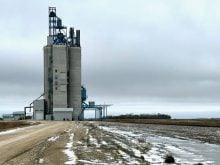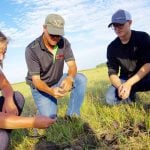VANGUARD, Sask. – The sight of a white-tailed deer springing over the pasture fence gives Norma Rousseaux respite from her troubles.
It reminds her of the mule deer that liked to dig up carrots in her garden every year.
Her husband Paul interrupts that happy thought.
“She’s probably searching for a lost fawn,” he said.
The search is cut short as the panicked animal nears the edge of the recently expanded Notukeu Creek. A torrential downpour has turned the quaint little stream into a full-fledged river, spanning a kilometre and a half from bank to bank.
Read Also

Farmland ownership fires up Saskatchewan politicians
Saskatchewan politicians debate the enforcement of farmland ownership laws in the province.
The Rousseaux’s acreage on the outskirts of Vanguard, Sask., sits in the middle of the newly created river. The house and other farmyard structures are still visible, but 80 acres of pasture and Norma’s garden are submerged under brown murky water.
This flood is the result of a near- record rainfall that deluged the village of Vanguard and surrounding vicinity early last week.
Environment Canada weather watcher Bob Burns emptied his rain gauge five times between the time the storm arrived around 4 p.m. on July 3 and when it ended at 1:20 a.m. on July 4.
He collected 333 millimetres (13.1 inches) of water during that period but calls that number “very conservative” because sometimes the rain came down at such an angle and velocity that it bypassed the gauge. During one half-hour period between 7:45 p.m. and 8:15 p.m., the gauge captured 50.8 millimetres (two inches) of rain.
But a plastic gadget can’t tell the story of the flood. It resides in the eyes of victims like the Rousseauxes.
It’s the day after their night of terror and they’ve only had one hour of sleep. Following a brief interview with a reporter at a relative’s house, the couple agrees to head out to inspect their farm from the closest vantage point.
The grid road along their pasture disappears into the muddy water about one kilometre from the home where they were rescued by motorboat the previous night. The water gurgles a few metres from the toes of their rubber boots as they survey the surroundings.
Norma thinks the water has pushed the house slightly off its foundation, but Paul isn’t sure. It’s hard to tell because the structure is partially hidden by trees. Even if the foundation survives, there will be damage and a massive cleanup.
Norma recalls that near the beginning of the storm she dashed outside, picked up a hailstone a little smaller than a golf ball and put it into a freezer in the basement. The memento didn’t stay there long, as water gushed into their house around midnight and flooded the basement.
“The two deep freezes opened up and off went the meat sailing down the creek and my little golf ball.”
Shortly after that the couple got another surprise.
“The mice and the frogs were coming in,” said Norma, who is wearing the same sweatshirt and sweatpants she had on the night before. There wasn’t time to pack her bags.
Paul can see that the school bus is all right and figures he’ll only have to change the differential oil in the tractor because he and a neighbor managed to bounce the front wheels up onto a cement pad before they fled.
Norma is dismayed about the yard. They hosted an outdoor wedding for their youngest son there the previous weekend.
“It’s actually the prettiest it has ever been,” she said.
Despite the fact that the chicken coop is built on a bit of a hill, water from the overflowing creek was halfway up the sides of the building when they left in the motorboat.
Paul has written off his flock of 50 birds who probably leapt to their death from the roosts at feeding time.
“I don’t expect they’ll be there,” he mumbles. “They’ll be there, but not alive.”
Norma points to the cattle marooned on a small stretch of grass in front of the Quonset. Shielding her eyes on this bright sunny day, she starts to count, bouncing her index finger up and down in the air as she goes.
The water level has dropped enough that the tips of the pasture fence are poking out. Clumps of soggy grass hang from the first few strands of barbed wire like rows of tattered socks on a clothesline.
Earlier in the morning they could only see seven or eight head, but this time she finds 11 of their 13 animals. The Quonset or larger animals may be obscuring the other two from her view.
It’s a sliver of good news in what has been a disastrous and exhausting 24 hours.
“We don’t have insurance on nothing – nothing,” said Paul, who is itching to find a way to get out to his acreage and assess the damage. “We have to depend on disaster assistance.”
He shakes his head in disbelief and reflects on his decision to buy the parcel of land back in 1981.
“Too close to the creek,” he said.
“Much too close to the creek. We used to have a farm five miles north of town way up on top of the hill in the rocks. I wish we were still there.”















